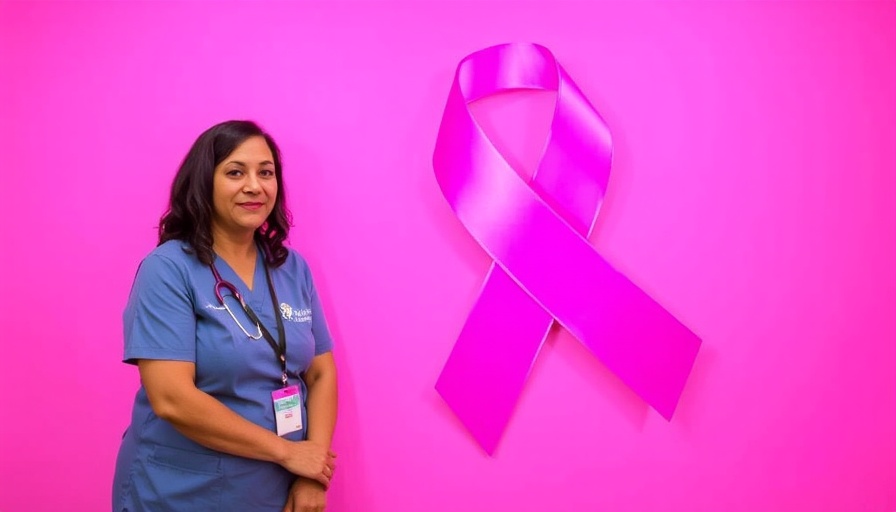
Empowering Women through Preventive Care: A Call to Action
Breast cancer remains a significant health concern for women across the United States, as noted by Baylor Scott & White Medical Center in Grapevine. According to the National Breast Cancer Foundation, nearly half of women delay preventive health services due to cost and access barriers. In light of these statistics, hospital President Naman Mahajan emphasizes the critical role of education and proactive healthcare in tackling this issue. "One of our fundamental beliefs is that women are the healthcare drivers of the family," Mahajan asserts, highlighting the ripple effect that women's health decisions can have on entire families.
Reframing Cancer Screenings
The stigma associated with the word "cancer" creates a culture of fear that can deter women from seeking necessary screenings. Mahajan points out that there is insufficient education surrounding preventive care, impacting timely diagnoses. "Until today, the stigma of the word cancer has had such a negative connotation with a lot of fear surrounding it," he remarks. The hospital aims to shift this narrative by encouraging women to view breast cancer screenings as vital components of their overall health regimen rather than as daunting tasks.
Positive Outcomes from Screenings
Baylor's statistics from the past year are encouraging: out of 14,000 breast screenings, only 175 detected positive findings. This translates to a remarkable 99% chance of receiving a clean bill of health, further emphasizing the importance of awareness around regular screenings. “Survival rates for breast cancer are astronomical,” Mahajan states, underscoring that early detection saves lives. Empowering women to undergo regular screenings can ultimately lead to better health outcomes for individuals and families alike.
Supportive Care Beyond Screening
For those who are diagnosed, comprehensive care coordination is crucial in helping patients navigate their treatment journey. Baylor Scott & White Medical Center supports patients through the role of patient navigators, who serve as a single point of contact for coordinated cancer care. These navigators ensure that patients have personalized support throughout their journey, from screening to treatment.
Importance of Community and Emotional Support
Beyond clinical care, the hospital extends its commitment to survivorship by providing support groups and emotional counseling in partnership with the American Cancer Society. Mahajan notes, “Every year, we host a Cancer Survivors Day, and it is very well attended.” This reflects the resilience of patients and the profound community bonds that form throughout the cancer journey, reinforcing the belief that treatment is only one aspect of a larger healing narrative.
Financial Accessibility: A Priority
While affordability of screenings remains a persistent concern for many, Baylor Scott & White employs financial counselors to help patients manage costs. This includes payment plans and working with insurance providers, many of which now cover annual screening mammograms. Ensuring access to financial assistance can empower women to prioritize their health without the burden of financial worry.
Health Education: Breaking Down Barriers
Educating women about how to perform self-breast exams and understand the signs of breast cancer plays a vital role in empowerment. Having knowledge about breast health and recognizing changes can significantly increase the likelihood of early diagnoses, leading to better outcomes. Awareness campaigns, especially during the Breast Cancer Awareness Month, aim to inspire women to prioritize their health through routine screenings.
A Holistic Approach and Lifestyle Changes
Maintaining breast health isn't solely about screenings; it also involves healthy lifestyle choices. Engaging in regular physical activity, eating a balanced diet, and limiting alcohol intake can contribute to reducing breast cancer risks. Encouraging women to adopt these habits is crucial in fostering a more holistic approach to breast health.
Looking Ahead: Future of Breast Cancer Awareness
As the healthcare landscape continues to evolve, ongoing collaboration among healthcare providers, advocacy groups, and the community is essential. Implementing workshops, digital campaigns, and easy access to information will empower women and help combat misconceptions surrounding breast cancer. The mission is clear: by building a culture of awareness and accessibility, we can significantly impact breast cancer prevention and survivorship.
With a collaborative effort, the aim is to see a significant reduction in breast cancer mortality rates in the coming years. Education remains the primary tool in this fight, enabling women to take control of their health and advocate for themselves and their families.
Ultimately, we must adopt a mindset of empowerment and prevention and recognize that early detection is a crucial step in the journey against breast cancer. It’s time to take action.
 Add Element
Add Element  Add Row
Add Row 



Write A Comment